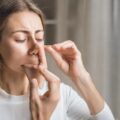As the fall season approaches, many people experience symptoms that could be indicative of seasonal allergies or, more concerningly, COVID-19. Understanding the differences between these conditions is crucial for proper treatment and ensuring public health safety. In this article, we will delve into the symptoms of fall allergies and COVID-19, helping you decode what your body might be signaling.
Understanding Fall Allergies
Fall allergies are typically triggered by allergens such as ragweed pollen, mold, and dust mites. These allergens can cause a variety of symptoms, including:
- Sneezing
- Runny or stuffy nose
- Itchy eyes, nose, or throat
- Watery eyes
- Postnasal drip
These symptoms are often manageable with over-the-counter antihistamines or other allergy medications. However, the overlap of symptoms with COVID-19 can cause confusion.
Recognizing COVID-19 Symptoms
COVID-19, caused by the SARS-CoV-2 virus, has a wide range of symptoms that can vary significantly from person to person. Common symptoms include:
- Fever or chills
- Cough
- Shortness of breath or difficulty breathing
- Fatigue
- Muscle or body aches
- New loss of taste or smell
- Sore throat
- Congestion or runny nose
- Nausea or vomiting
- Diarrhea
Given the severity and potential complications of COVID-19, it is essential to differentiate it from other conditions like fall allergies.
Key Differences Between Fall Allergies and COVID-19
While there is some overlap in symptoms, there are key differences that can help distinguish between fall allergies and COVID-19:
- Fever: A fever is common with COVID-19 but not with fall allergies.
- Loss of Taste or Smell: This symptom is more specific to COVID-19 and is not typically associated with allergies.
- Itchy Eyes and Nose: These are more common with fall allergies and less so with COVID-19.
- Duration: Allergy symptoms persist as long as the individual is exposed to allergens, whereas COVID-19 symptoms develop and change over time.
If you are unsure about your symptoms, it is always best to consult a healthcare professional for an accurate diagnosis.
When to Seek Medical Attention
It is important to seek medical attention if you experience any symptoms that could indicate COVID-19, especially if you have been in contact with someone who has tested positive for the virus. Symptoms to watch for include:
- Difficulty breathing
- Persistent pain or pressure in the chest
- New confusion
- Inability to stay awake
- Bluish lips or face
These symptoms require immediate medical attention as they could indicate severe complications from COVID-19.
Preventive Measures
Preventing both fall allergies and COVID-19 involves taking proactive steps. For fall allergies, consider:
- Keeping windows closed during high pollen counts
- Using air purifiers
- Regularly cleaning your home to reduce dust and mold
For COVID-19, follow public health guidelines such as:
- Wearing masks in crowded places
- Maintaining physical distance
- Regular hand washing with soap and water
- Getting vaccinated
FAQs
1. Can you have fall allergies and COVID-19 at the same time?
Yes, it is possible to have both conditions simultaneously. This can make it more challenging to distinguish between the two, so consulting a healthcare provider is advised.
2. How can I tell if my symptoms are due to allergies or COVID-19?
Pay attention to specific symptoms such as fever and loss of taste or smell, which are more indicative of COVID-19. Allergy symptoms like itchy eyes and nose are less common with COVID-19.
3. Should I get tested for COVID-19 if I have fall allergy symptoms?
If you experience symptoms that overlap with COVID-19, such as a cough or congestion, it is wise to get tested, especially if you have been exposed to someone with COVID-19.
4. What treatments are available for fall allergies?
Over-the-counter antihistamines, decongestants, and nasal corticosteroids can help manage fall allergy symptoms. Consult a healthcare provider for personalized recommendations.
5. Are there any long-term effects of COVID-19?
Some individuals experience long-term effects known as “long COVID,” which can include symptoms like fatigue, brain fog, and respiratory issues. Ongoing medical research is focused on understanding and managing these effects.









